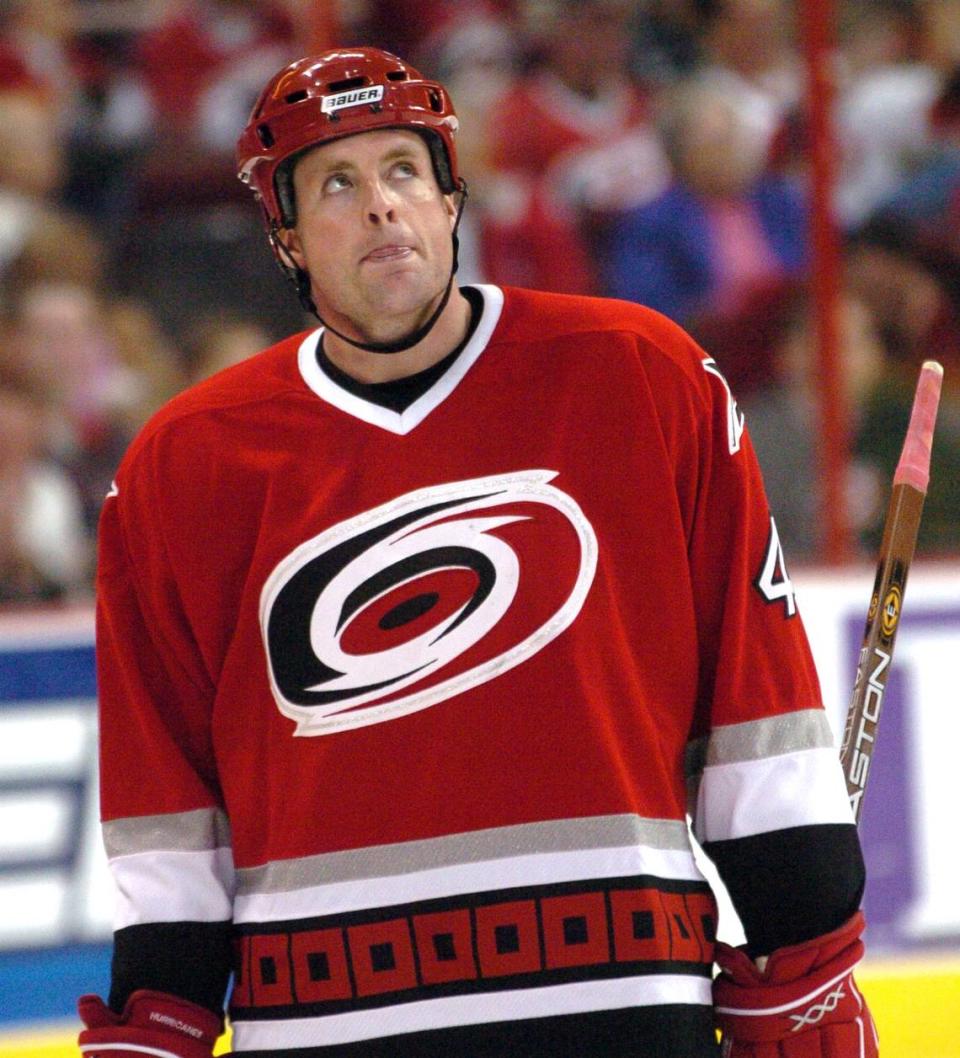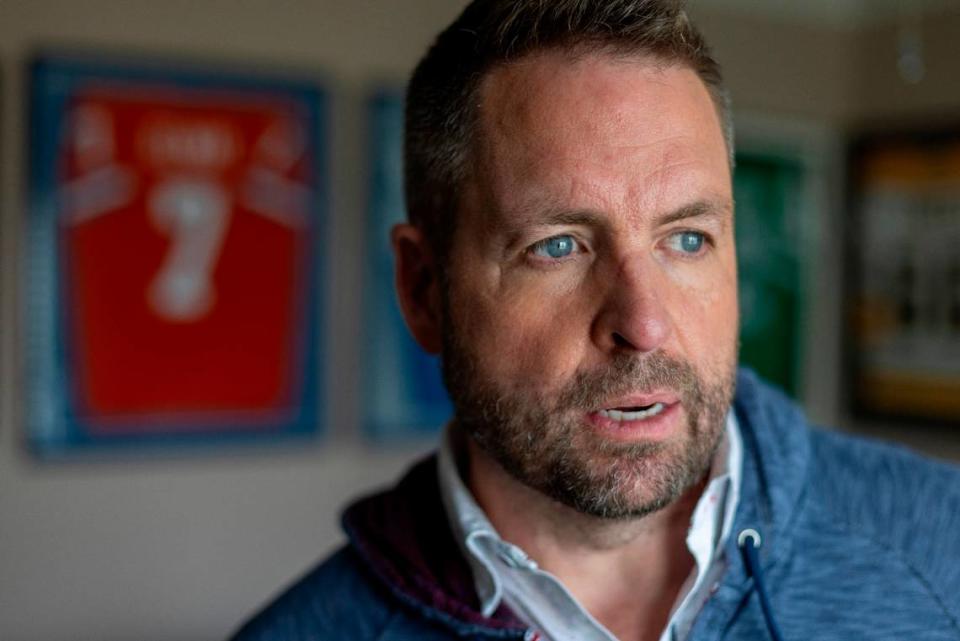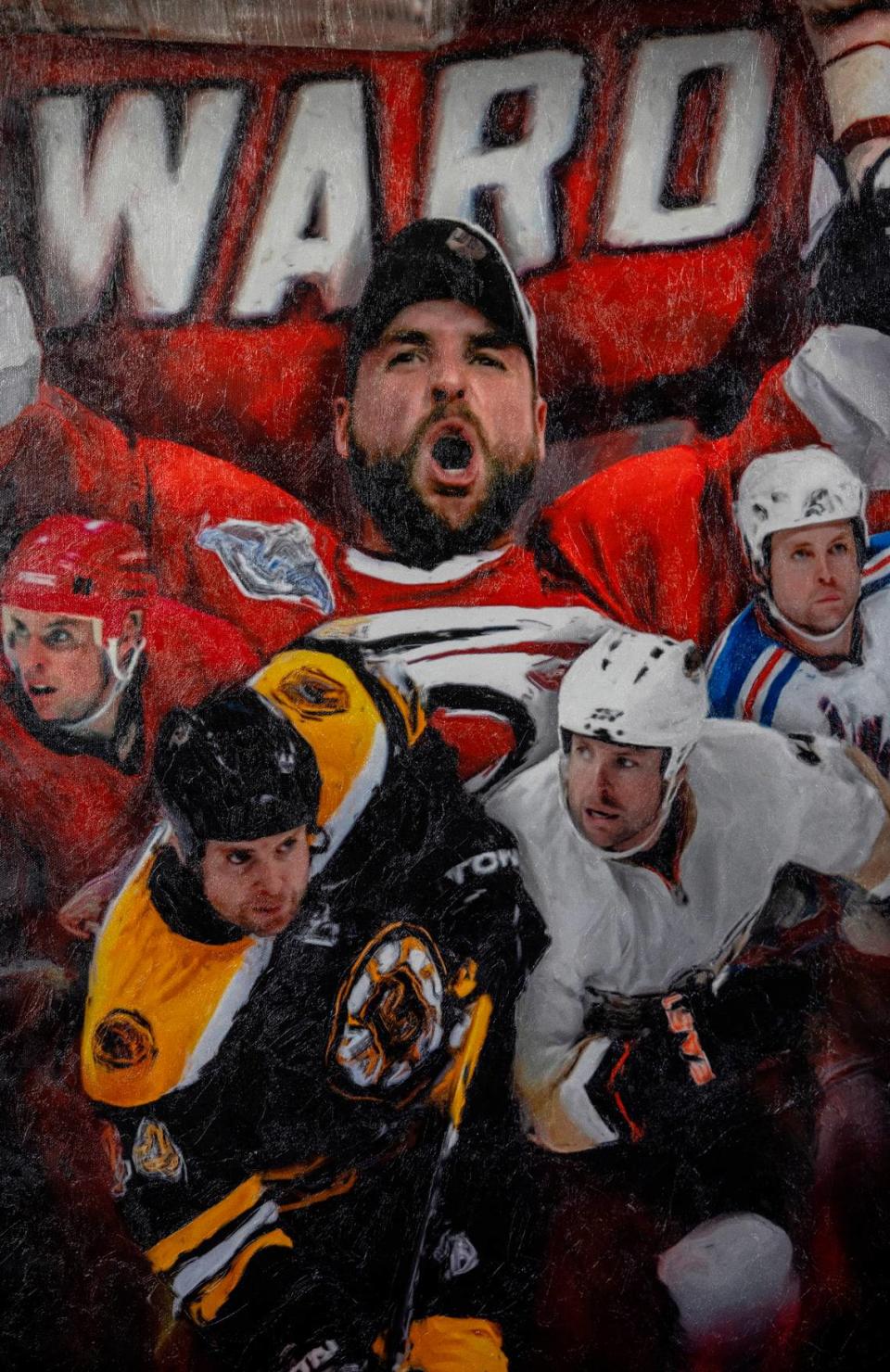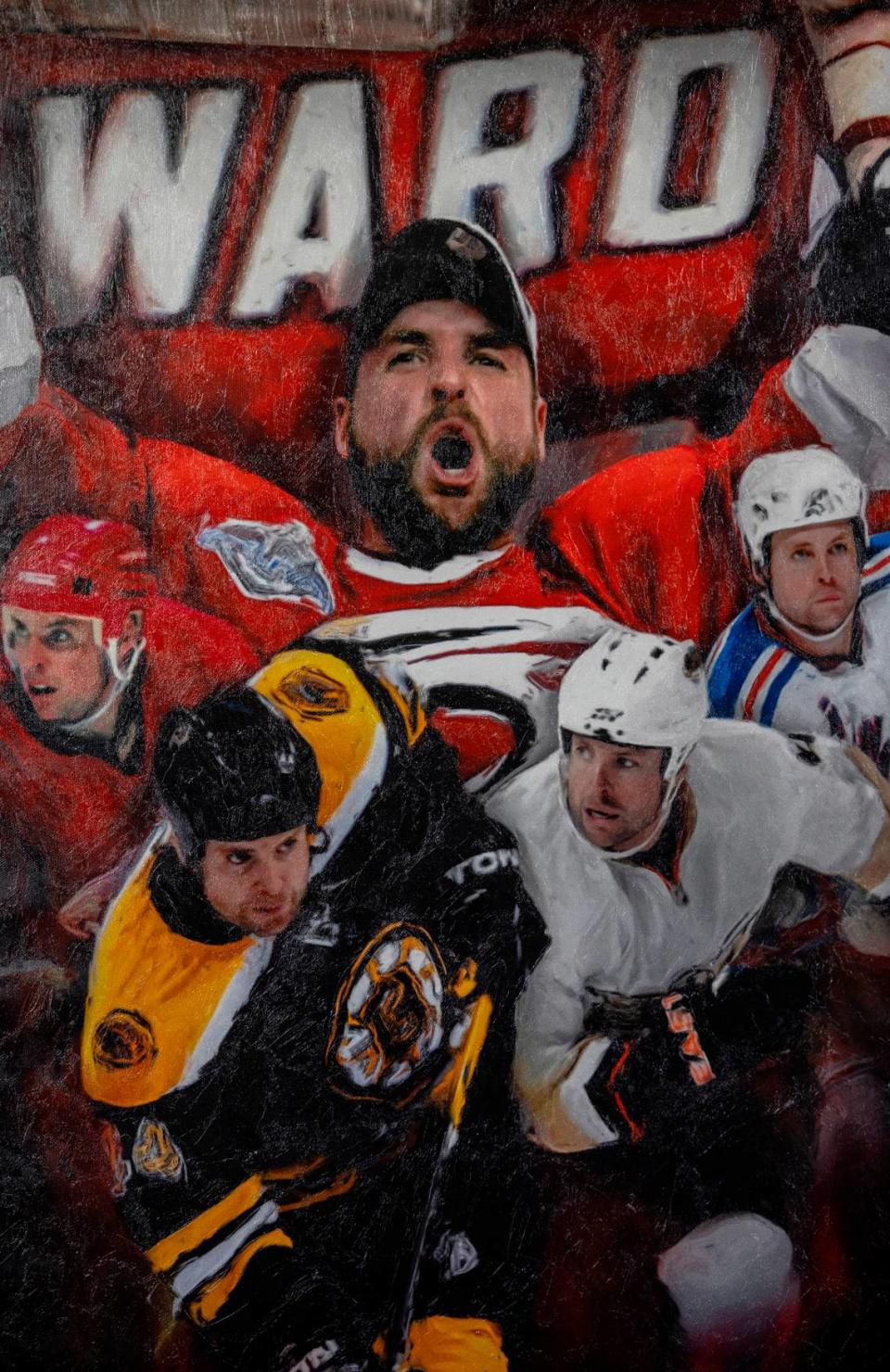The gambling ads are everywhere. On the boards. On the ice. During the commercials. In the middle of the broadcasts. When the Carolina Hurricanes played at PNC Arena during the playoffs, there were advertisements for three different online sportsbooks on the playing surface.
The ads have become overwhelming. They are ubiquitous, and for Aaron Ward, they’re a constant reminder of how he lost everything. He gambled away a life and career he has been trying to rebuild ever since.
Gambling wasn’t the only cause of Ward’s downfall, but it was his primary vice, his addiction, his escape from reality, until reality came crashing down on the former Hurricanes defenseman.
He lost his marriage, his prominent job on Canadian television and his place in the hockey media. He had to build entirely new relationships with his three children, whose childhood he scarred. His 2015 arrest after getting in an argument with his then-wife at their Cary home was the proximate cause — the charges were later dropped and expunged, which didn’t come with the same international headlines — but it was also the rock-bottom moment that led him to accept an offer of help.
“My agent, over and over, made attempts,” Ward said. “I’ve gone back to those people and reconciled: In retrospect, years later, I appreciate you. I just wasn’t in a place where I could recognize and understand what you meant by it. I just felt like I had everything under control. I was just completely hiding that I was out of control.”
Nine years later, with the help of a Duke psychologist the NHL Players Association helped him find, Ward has explored his gambling addiction and is now trying to help others who find themselves at similar dead ends, whether those are former teammates or just random people who heard his story and contact him through social media.
Every one of those conversations is a building block in the new life he is trying to construct. But how can you really leave it all behind when, in a state where sports gambling has now been legal for more than two months, it seems to follow you everywhere?
“It’s nauseating,” said Ward, 51. “The worst part is, I watch the game, the commercials come on, I know what’s coming. I can’t see Kevin Hart do any more commercials. All of them. I know every commercial. Painful.”
Still, there’s no undoing what’s been done. The hardest part, for Ward, has been convincing people that he isn’t the person now that he was before. There are no amends to be made, no penance to be done. Just another day to try to be better.
“When I talk to Aaron now, the thing that I’m struck with is his acceptance of it all,” said ESPN broadcaster Ray Ferraro, who became a sounding board for Ward. “And his positivity about just keeping plowing away. Next step, next step, next step. An acceptance of where he’s at. There’s no self-pity.”
Out of control
It started in college, for $5 or $20. In the minor leagues, with no games on Sundays, Ward would bet $50 or $100. When he got to the NHL, it was $1,000 a game. And then more. And more. Seattle not giving the ball to Marshawn Lynch? Ward went from losing $50,000 he didn’t have to winning the $50,000 he needed to pay a debt.
Ward said he bet almost exclusively on the NFL through illegal bookmakers, never on hockey, not in casinos, and always through intermediaries to protect his identity, so he could not be pressured to throw a game or anything of that kind. That was all part of the illusion of control. He was a football expert who did his research and didn’t bet hunches. He knew what he was doing.
What was driving it? It took Ward years of therapy to dig at the roots, something he prefers to keep to himself. But this was among Ward’s other public disclosures in retirement: As a hockey player at Michigan, he was among the more than 1,200 athletes who have said they were sexually abused by university doctor Robert Anderson, one of several in the Big Ten who acted as a university-coddled predator for years with impunity.
Coincidence or not, Ward said he placed his first wager in the same building where he’d gone for treatment with the football players on a hockey off day and first been assaulted by Anderson.
“I don’t blame my gambling on that,” Ward said. “I’m responsible for the decisions I made. Contributing factor? Maybe. But I’m not looking for excuses.”
In retirement, like many professional athletes, he tried to fill the void left by not playing hockey, by not going to the rink every day, by not preparing for the next game or the next practice. In his psyche. In his identity. Ward had been a top prospect since childhood and played 13 seasons in the NHL. And then, when he was 37, it was over.
He won three Stanley Cups, two as a depth player with the Detroit Red Wings, and more memorably with the Hurricanes in 2006. He also played for the New York Rangers, Boston Bruins and Anaheim Ducks, with one brief second stint with the Hurricanes, although in his later career he was more famous here for getting sucker-punched by the Hurricanes’ Scott Walker while playing for the Bruins during the 2009 playoffs.

As a player, he’d always appreciated the attention of the media, winning the Josef Vasicek Award for media cooperation from the Carolina chapter of the Professional Hockey Writers Association in 2006, always volunteering to do interviews in his middle-school French when the Montreal Canadiens were in town. He was willing to be funny, controversial, brash. He liked the spotlight.
Not surprisingly, he made a quick move to television, landing a prime studio gig with TSN, Canada’s equivalent of ESPN. Ward was in demand, an ex-athlete who made a successful post-career transition. His twice-weekly radio appearances in Montreal with Mitch Melnick, who hosts the city’s must-listen afternoon show, were the beginning of a decade-long relationship there.
“At first, he was just so good,” Melnick said. “He was really good on the air. He’s got this Montreal vibe to him. He’s a character. He’s got a great sense of humor. He’s self-deprecating in his humor. But also, when it’s time to get serious, like serious hockey analysis, like now in the playoffs? He’s as good as anybody.”
It wasn’t enough. He was not in control. He thought he was. But he never was.
Gambling, everywhere
As the Hurricanes’ season ended Thursday with a 5-3 loss to the New York Rangers in Game 6 of their second-round series, Ward watched from the press box, credentialed for The Fourth Period, a hockey podcast. Within view, there were ads for FanDuel, ESPN Bet and Betway, the last an NHL sponsor that isn’t even licensed to operate in North Carolina.
Ward’s former Hurricanes teammate Kevin Weekes is an advertising spokesman for DraftKings, and the TNT and ESPN broadcasts often include live odds. Every sport has been saturated with gambling content and advertising, and hockey is no exception, especially since sports gambling became legal in North Carolina in March.
The justification for legalization has always been that it was happening anyway, and that by bringing it into the light it could be regulated, controlled and treated — and become a taxable profit center for the state. And that’s all true. But seeing it in action, and especially the app-based gamification of it, certainly illustrates how low the barrier to entry has become.
The NC Lottery Commission said that $649 million was wagered in April, the first full month of legal wagering. Bettors lost $105 million, with sportsbooks paying almost $20 million in taxes. But East Carolina criminal justice professor Michelle Malkin, who studies gambling behavior, cautioned that not enough has been set aside by the legislature to help the people who are doing the gambling.
“I’m not surprised at all with what’s happened with people being amazed at the number of advertisements, especially on radio and television,” Malkin said. “I anticipated that would happen. Everybody has been talking about the bonuses, how easy it is to think, ‘I can deposit $10 and get $250 in bonuses.’ It sounds really attractive.
“The problem is, if you’re not educated in gambling, and the mind isn’t fully formed in young adults, it sounds more attractive than it should. Someone who gets an early win in the first few months, we’re particularly concerned that if they don’t know how to set limits, they’ll chase the high of that win.”
In 2022, Malkin’s research indicated North Carolina had a 5.5 percent rate of problem gambling, right around the U.S. median — although higher than expected given that the only legal gambling in the state was at Cherokee tribal casinos. She cautioned then that percentage was likely to increase if sports betting were legalized, although she said it’s still too soon to say definitely now.
The NCAA has also moved to ban wagering on individual player performances in states like North Carolina where it remains legal because of the potential for abuse, something that’s already happened in the NBA. Meanwhile, more than a dozen pro athletes have been suspended over the past two years for violations of their leagues’ gambling policies, including Shane Pinto of the NHL’s Ottawa Senators.
“We do know through multiple research projects that athletes are at some of the highest risk for disordered gambling and gambling that takes higher risks,” Malkin said. “And they don’t have to be professional or NCAA athletes. Athletes in general are less risk-averse. They know to push themselves against the odds. When it comes to gambling, that’s the same part of the brain that gets them to continue when their body tells them to stop, or climb a hill that seems impossible.”
It all falls down
On Oct. 9, 2015, Ward’s then-wife Kelly placed a 911 call from the Cary subdivision where Ward and his family had lived since 2009. Ward said she discovered an old email address that Ward had been using for gambling and anything else he wanted to hide. They argued. Ward was arrested and charged with assault on a female and interfering with emergency communications, both misdemeanors.
It was a Friday afternoon and he couldn’t be bailed out until Monday. Ward spent the weekend in Wake County Jail.
Four months later, the charges were quietly dropped and later expunged from his record, and Ward maintains he never actually assaulted his wife. (His wife was also briefly charged with assault.) But that’s a bell that cannot be unrung. His mugshot appeared in nearly every newspaper in Canada.
Arrests are big news. Dropped charges and expunged convictions are not. The presumption of innocence in court rarely extends to the public realm, and an arrest or indictment often lives on the internet forever. The dismissal may never make it that far.
Ward’s North Carolina court record includes his divorce, and a pending dispute with his ex-wife over alimony Ward said has been settled, and several dismissed traffic violations. But there’s nothing about that day in October on his record now, even as its consequences linger.
Over the course of a weekend, Ward went from media star to media pariah. He was suspended from TSN and then dropped.
In the immediate aftermath of his arrest, a representative from the NHL/NHLPA Player Assistance Program — a joint program designed to confidentially intervene with current and former players with addiction, mental health or behavioral issues — reached out and asked if Ward needed help.
For the first time, Ward said yes.
“My stuff played out publicly,” Ward said. “It’s not the best way for it to happen.”
Ward was asked: “Did it have to happen that way for you to get help?”
A long pause.
“How do I answer this?” Ward said. “The best thing that ever happened to me was running face-first into that wall. Because you can nibble around the edges all you want. But if you’re sitting there and you’re being criticized on all levels of who you are and who you’re about, you sit there and struggle and realize: This is how people view you. This is the person they equate you to being. It’s like a level of inner chaos you’re not really equipped to deal with.”
Over the course of his journey, working with a psychologist at Duke, digging into his past and embracing a new future, Ward connected with Ferraro. Over roughly the same period, Ferraro gradually reduced and then dropped entirely his coveted role as TSN’s lead game analyst as he addressed his own work-life balance, even if his issues weren’t the same as Ward’s.
The two were acquaintances, not friends, but shared a kindred desire to take control of their lives and who they are. To be better.
“It had to be really hard, from where Aaron was, to make that step,” Ferraro said. “To say, ‘I’ve got to do this, man. I’ve got to dig into this.’ Aaron’s loud and energetic, super energetic, but he had to stop and go, ‘I’ve got to slow down. I’ve got to figure that out.’ That’s not easy to do.”

There is a way out
Melnick, whose show had often featured Ward as a guest before the arrest, was the first to welcome Ward back to public life, after the charges were dropped and Melnick accepted Ward’s explanation for what happened. (“Had to get clearance from the head office in Toronto,” Melnick said. “I don’t like taking no for an answer.”) Over the next few years, Ward’s twice-weekly afternoon appearances steadily gained popularity until he became the daily 5:05-5:30 p.m. guest.
On Fridays, it was “Ask Aaron Anything,” when listeners could text whatever questions they wanted. It became Ward’s public confessional. That was the first place he talked about his gambling addiction. It was the first place he talked about being abused at Michigan, in January 2021. It just came out. It forced its way out.
“We all looked at each other in the studio,” Melnick said. “I had to pause. I was not expecting that. I had no idea. But we also recognized how powerful it was, what he had just said, what had happened to him. With both the gambling and that instance, we don’t take phone calls but we have a text board, and the reaction from people who have been through similar experiences was overwhelming.”
After that, people started reaching out from every direction. Former teammates. Other NHL players. Random hockey fans on both sides of the border, asking for help. To Ward, this was a gift. An opportunity to show who he is now. So that helps fill the void. It provides validation, that trying to turn his life around was and is worth it to people other than himself.
“I’ve done that with so many people,” Ward said. “I never thought I would actually share that, that people reach out. It does affect me nowadays, the fact that I have to see FanDuel absolutely nonstop, and there are people who are struggling and their idols and the people who have value on their teams are out there promoting all of this.”

Which, Ward admits, as a player, he wouldn’t have hesitated to do as well. No judgment there. There’s a finite amount of time for any athlete to cash in on his or her career and celebrity. The ubiquitousness of gambling in sports now is an annoyance to him, not a temptation.
But above all else it is another catalyst for telling his story now, so people know: There is a way out. There is help. There is a different ending.
Never miss a Luke DeCock column. Sign up at tinyurl.com/lukeslatest to have them delivered directly to your email inbox as soon as they post.
Luke DeCock’s Latest: Never miss a column on the Canes, ACC or other Triangle sports
